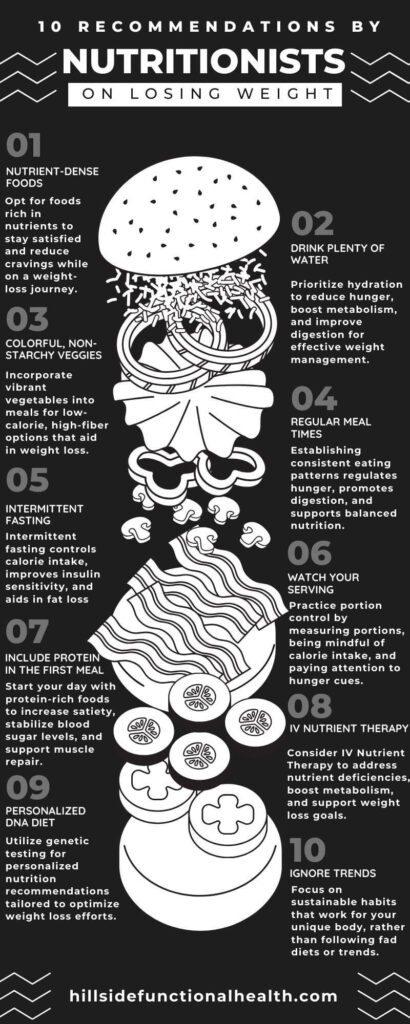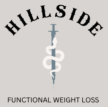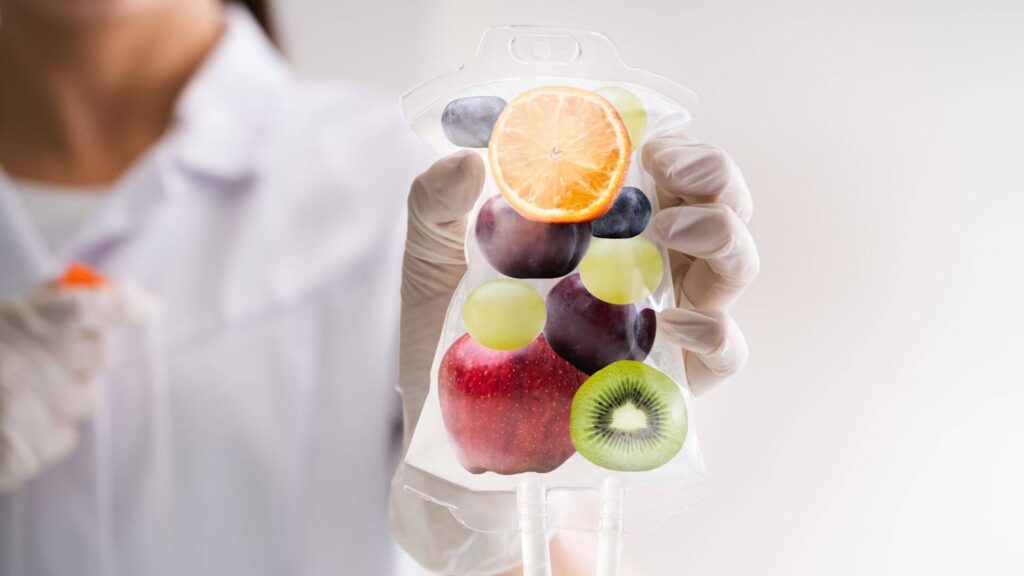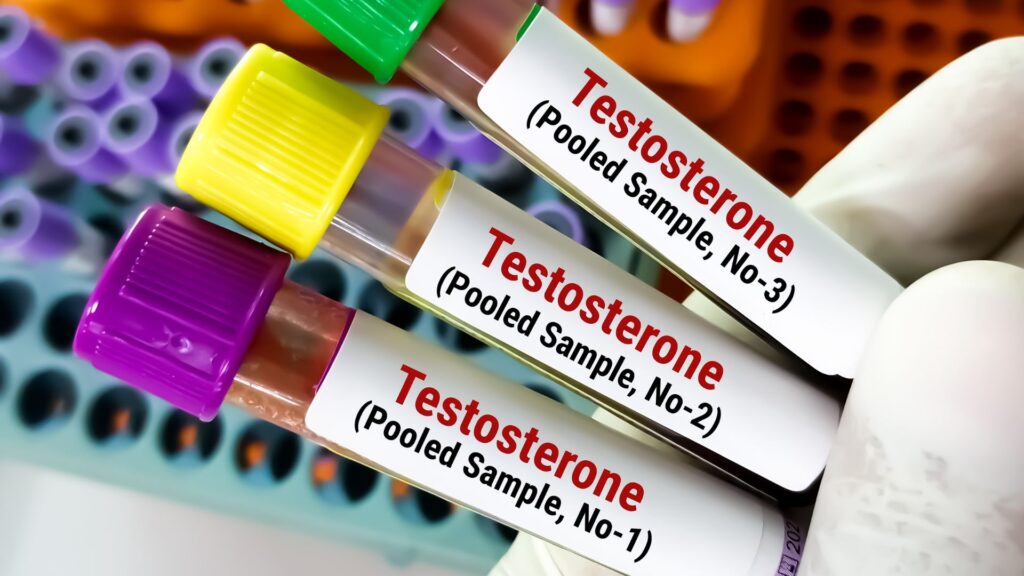Are you fed up with trying countless weight loss tips and diets without seeing sustainable results? It’s time to turn to the experts—nutritionists. Their evidence-based recommendations hold the key to successful weight loss. Being one of the leading institutes for weight loss Baytown, Hillside will help you discover the nutritionists’ recommendations for weight loss to help you create a healthy, balanced diet and make positive lifestyle changes.
Whether you’re looking to shed a few pounds or embark on a transformational journey, nutritionists emphasize the importance of making sustainable changes to your diet and lifestyle. By following their advice, you can achieve long-term results while improving your overall health.
10 Key Recommendations From Nutritionists on Losing Weight:

1. Choose filling, nutrient-dense foods
Nutritionists recommend choosing filling and nutrient-dense foods as part of a weight-loss diet. These foods provide a high amount of essential nutrients while keeping you satisfied and reducing cravings.
Some examples of filling, nutrient-dense foods that you can incorporate into your diet include:
- Fruits: such as berries, apples, and oranges
- Vegetables: like broccoli, spinach, and carrots
- Whole grains: including quinoa, brown rice, and oats
- Lean protein sources: like chicken breast, tofu, and Greek yogurt
- Healthy fats: like avocado, nuts, and olive oil
These foods contain low calories but high vitamins, minerals, and fiber. By including them in your meals, you can improve satiety and ensure you get the necessary nutrients for your body to function optimally.
2. Eat more colorful, non-starchy veggies
Nutritionists recommend increasing your intake of colorful, non-starchy vegetables as part of a healthy weight loss journey. These vegetables are not only delicious but also low in calories and fiber; this combo is a pretty good choice for those looking to shed some pounds.
Include a variety of colorful, non-starchy vegetables in your meals to enhance their nutritional value and add visual appeal to your plate. Some examples of these vibrant veggies include:
- Broccoli: Packed with vitamins C and K, as well as fiber, broccoli is a versatile vegetable that can be enjoyed in the form of roasted, salads, or stir-fries as a side dish.
- Bell peppers: Whether red, green, or yellow, bell peppers are loaded with antioxidants and provide a satisfying crunch. They can be added to salads, stuffed with lean proteins, or used in stir-fries.
- Spinach: A good source of iron, vitamins A, C, and folate. It can be included in salads, smoothies, or sautéed as a side dish.
- Kale: Known for its nutrient density, kale offers vitamins A, K, and C, along with antioxidants. Use it in salads or soups, or even bake it into crispy kale chips.
- Carrots: Rich in beta-carotene, fiber, and antioxidants. Enjoy them raw as a snack, grated in salads, or roasted as a side dish.
- Cucumbers: Refreshing and hydrating, cucumbers are low in calories and water content. Add them to your regular salads, snacks, or sandwiches, or enjoy them as a light snack.
The high fiber content in these veggies promotes feelings of fullness and aids digestion, helping you achieve your weight loss goals without adding to your calorie intake. . Additionally, you get vitamins, minerals, and antioxidants.
3. Drink plenty of water daily
One of the simplest yet most effective nutritionist recommendations for weight loss is to prioritize hydration by drinking plenty of water daily. Staying hydrated is super critical for your overall health and can aid in your weight loss journey.
Drinking at least 3 liters (100 oz) of water throughout the day can have multiple benefits for weight loss:
- Reduced feelings of hunger: Drinking water can help curb your appetite and reduce hunger. Sometimes, thirst can be mistaken as if you’re hungry, and staying hydrated can prevent unnecessary snacking or overeating.
- Boosted metabolism: Adequate hydration is necessary for efficient metabolism. When you’re well-hydrated, your body can function optimally, including burning calories.
- Improved digestion: When food is consumed, water is needed to help break it down and break particles into smaller sizes. This aids in the absorption of nutrients into the bloodstream. Efficient digestion allows the body to fully access and use the energy and nutrients from meals.
Staying well hydrated supports optimal digestive function, which is significant for weight management goals as it maximizes how much nutrition the body derives from food instead of storing it as fat. Proper hydration is one factor that can help one’s body convert more of what’s consumed into usable fuel rather than unneeded weight gain.
Aim for at least 12 cups (100 ounces) daily to ensure you’re getting enough water. Factors like physical activity level, environmental temperature or humidity, and existing medical conditions may impact hydration needs and require adjusting fluid consumption upwards or downwards in some cases.
Here’s an example of how you can incorporate water into your daily routine:
| Time | Action |
| Morning | Start your day with a glass of water to rehydrate after sleep. |
| Throughout the day | Carry a water bottle with you and sip on water regularly. Set reminders if needed. |
| Before meals | Drink a glass of water before each meal to help you feel fuller, preventing overeating. |
| During and after exercise | Hydrate before, during, and after workouts or physical activities to replenish fluids lost through sweating. |
| Evening | Finish your day with a glass of water to stay hydrated overnight. |
Remember, staying hydrated is essential for weight loss and overall well-being. Drinking enough water is a healthy habit, and prioritize hydration as part of your weight loss journey.
4. Stick to regular meal times
Nutritionists suggest sticking to regular meal times as part of a weight loss plan. Eating at consistent times throughout the day can have several advantages for weight loss and overall health:
- Regulates hunger: Following a regular eating schedule can train your body to expect meals at specific times. This helps regulate your hunger and prevents impulsive snacking between meals.
- Promotes better digestion: When you eat at regular intervals, your body can better anticipate and prepare for the digestion and absorption of nutrients. This can improve digestion and nutrient absorption.
- Supports balanced meals: Planning your meals and sticking to a schedule allows you to create balanced meals that meet your nutritional needs. Aim for three balanced meals a day consisting of various nutrient-rich foods.
Additionally, establishing a regular eating schedule helps create structure and consistency in your daily routine, making it easier to maintain healthy eating habits. Listen to your body’s hunger and fullness cues and adjust your meal sizes accordingly.
5. Try an intermittent fasting schedule
Intermittent fasting has become a popular weight loss approach that involves alternating between fasting and eating periods. According to nutrition experts, this can be a viable weight management strategy when done correctly.
There are different intermittent fasting methods one can follow. One example is the 16/8 method, which dedicates 16 hours per day to fasting and restricts eating to an 8-hour window.
Another is alternate-day fasting, where no calories are consumed every other day, and normal meals are had on non-fasting days. It’s important to choose a schedule that works best with your lifestyle.
Intermittent fasting may aid weight loss in several ways. Limiting eating to only certain hours can help reduce total calorie intake, leading to a calorie deficit needed for weight loss. It may also improve insulin sensitivity and help burn stored body fat for energy during fasting periods.
However, before beginning an intermittent fasting routine, especially for those with health issues or who take medications, it’s wise to consult a doctor first.
A medical professional can ensure this eating pattern is suitable and provide guidance tailored to individual needs. Proper supervision is important to both achieve weight loss goals safely and avoid potential risks.
| Fasting Method | Description |
| 16/8 Method | A daily fasting of 16 hours, with an 8-hour eating window. |
| Alternate-Day Fasting | Fasting every other day and consuming normal meals on non-fasting days. |
6. Watch your serving amounts
Portion control has an important role in successful weight loss. Carefully monitoring your serving sizes can help you maintain a calorie deficit. Here are some effective strategies:
- Weigh or measure foods using measuring cups or a digital scale. This ensures you eat appropriate portion sizes and avoids over consumption.
- For times when tools aren’t available, use visual cues. A serving of meat should match the size of a deck of cards and pasta about the size of a tennis ball.
- Be mindful of your daily calorie intake. Even healthy foods can lead to excess calories if eaten in large amounts, hindering weight loss goals. Closely track calorie amounts throughout each day.
Portion control also means listening to your body. Eat slowly and notice fullness signals. Stop eating when comfortably satisfied rather than stuffed.
Furthermore, reflect on emotional triggers. Some turn to food for comfort during stress. If this describes you, explore healthier ways to manage emotions, like talking with friends or relaxing activities you enjoy. Staying aware of cues can help prevent using food to cope.
7. Include protein in the first meal
When it comes to weight loss and creating balanced meals, nutritionists recommend including protein in your first meal of the day. Protein not only helps increase satiety and keep you feeling full for longer but also plays a super crucial role in controlling blood sugar levels, supporting muscle repair, and promoting growth.
There are plenty of protein-rich options you can incorporate into your breakfast. Some examples include:
- Eggs: Packed with protein, eggs are a popular choice for a protein-rich breakfast.
- Greek yogurt: With a creamy texture and high protein content, Greek yogurt is a nutritious option to start your day.
- Cottage cheese: A great addition to your morning routine as it is low in calories but high in protein content.
- Protein smoothies: These allow you to blend fruits, vegetables, and a protein powder (single scoop) for an easy breakfast that packs protein.
- Tofu: For plant-based eaters, tofu is a fantastic source of protein that can be added to breakfast.
Pairing your protein choice with whole grains like whole wheat toast or oats and adding fruits or vegetables provides a well-balanced meal with nutrients, fiber, and sustenance to fuel your day.
Beginning the day with a protein-rich breakfast may help curb cravings and overeating later as it establishes healthy eating habits from the start while supporting weight loss goals. The protein at breakfast also provides lasting energy.
8. Look into IV nutrient therapy
If you have nutrient deficiencies or struggle with weight loss, you may want to consider IV Nutrient Therapy. This treatment delivers essential nutrients directly into your bloodstream, providing a high concentration of vitamins, minerals, and amino acids that support metabolism, energy levels, and overall well-being.
IV Nutrient Therapy is often recommended by nutritionists as a targeted approach to address specific nutrient deficiencies and support weight loss. By bypassing the digestive system, the nutrients are absorbed more efficiently and enter your body’s cells directly.
Before considering IV Nutrient Therapy, it’s important to consult with a healthcare professional. They can assess your nutrient status through blood tests and evaluate whether this treatment is appropriate for your specific needs. They will help determine the right balance of nutrients and create a personalized plan tailored to your unique requirements.
Benefits of IV Nutrient Therapy for Weight Loss and Nutrient Deficiencies:
- Enhances metabolism to support weight loss efforts
- Boosts energy levels and reduces fatigue
- Improves overall nutrient absorption and utilization
- Helps address nutrient deficiencies more directly
- Supports immune system function
- Promotes detoxification
IV Nutrient Therapy can be a valuable addition to your weight loss journey, helping you optimize your nutrient intake and overcome any nutrient deficiencies that may be hindering your progress. However, it’s important to remember that it should be used in conjunction with other healthy lifestyle changes such as regular exercise.
| Common Nutrients in IV Nutrient Therapy | Potential Benefits |
| Vitamin C | Boosts immune system, supports collagen production, aids in detoxification |
| B Vitamins | Increases energy levels, supports healthy metabolism, improves mood |
| Magnesium | Relaxes muscles, promotes better sleep, reduces stress and anxiety |
| Amino Acids | Supports muscle repair and growth, aids in weight loss, improves athletic performance |
| Zinc | Boosts immune system, supports wound healing, aids in digestion |
9. Get personalized DNA diet advice
When it comes to weight loss, personalized DNA diet advice is revolutionizing the way nutritionists approach helping individuals achieve their goals. By considering an individual’s genetic makeup, professionals are able to provide targeted recommendations for optimal weight loss results.
Genetic testing is often recommended by nutritionists to gather valuable insights into an individual’s metabolism, nutrient needs, and response to certain foods. By analyzing your DNA, professionals can identify genetic variations that may impact your weight loss journey.
This information is then used to customize a personalized diet plan that aligns with your unique genetic profile. With personalized nutrition recommendations tailored to your genetic makeup, you can optimize your weight loss efforts and achieve long-lasting results.
It’s important to note that personalized DNA diet advice should be used in conjunction with other lifestyle factors such as timely sleep, balanced diet, regular exercise, and overall healthy habits. While DNA testing provides valuable insights, it’s essential to maintain a comprehensive approach to weight loss.
10. Ignore trends; you know your needs best
It’s important to remember that you are unique, and what works for someone else might not work for you. Don’t get caught up in the latest weight loss trends or fad diets that promise quick results. Instead, focus on what works best for your body and prioritize sustainable habits that you can maintain in the long run.
Building sustainable habits is key to successful weight loss. Rather than opting for extreme approaches, take a gradual and consistent approach. Make small changes to your diet and lifestyle that you can realistically sustain. This means adding more fruits and vegetables to your meals, finding an exercise routine that you enjoy, and practicing portion control.
Listen to your body and pay attention to how different foods and eating patterns make you feel. Your body is unique, and what works for someone else may not work for you. Experiment with different approaches and make choices that align with your own needs and preferences. Trust your instincts and remember that you are the expert in your own body and health.
Let Hillside Functional Weight Loss Help You Live Healthier:
If you are ready to commit to your health and are looking for a customized weight loss program that delivers real results, contact the medical professionals at Hillside Functional Weight Loss in Baytown, Texas, today. As a leader in weight loss Baytown TX services, our experienced team can develop an individualized plan tailored to your goals and needs.
By combining lifestyle counseling, nutritional expertise, and medical supervision as needed, we help our clients make long-lasting improvements to their well-being. Start your journey towards a healthier lifestyle – call now to get started on your customized weight loss Baytown TX program.



